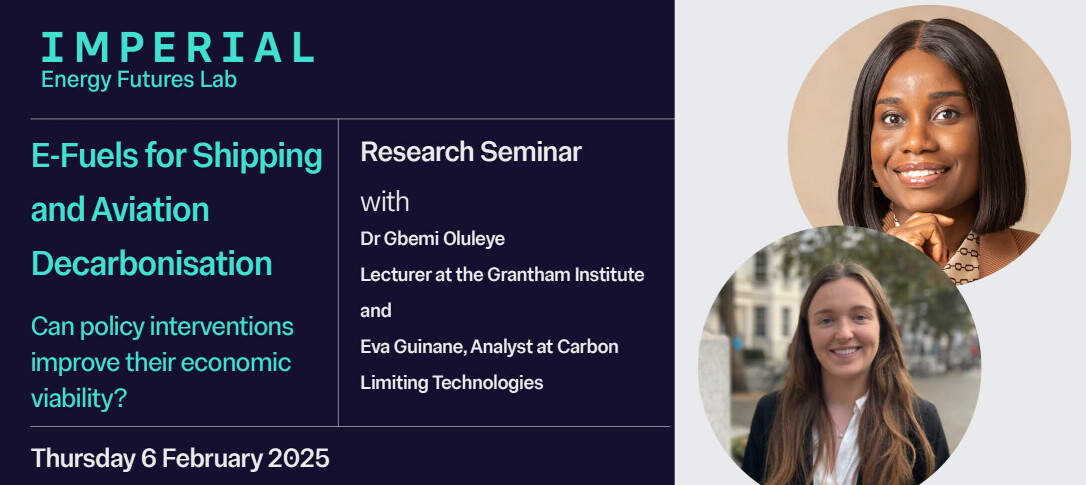
E-Fuels for Shipping and Aviation Decarbonisation
Can policy interventions improve their economic viability?
Decarbonizing shipping and aviation sectors are essential to achieving net-zero targets, and low-carbon synthetic fuels such as e-ammonia, e-methanol, and e-kerosene play a pivotal role. However, the high costs of these fuels compared to conventional options, such as Heavy Fuel Oil (HFO) and fossil-based jet fuel, present barriers to adoption. By 2050, global fuel demands are projected to be 3.5 EJ for e-ammonia and 0.85 EJ for e-methanol. UK mandates aim for 22% SAF by 2040, with 3.5% PtL-specific targets. This seminar explores the potential of market-based policy interventions to improve the economic viability of these e-fuels. A novel temporal market penetration optimization model is developed and applied to demonstrate the feasibility of achieving cost parity between synthetic fuels and HFO through an optimal mix of market-based policies, including carbon taxes, subsidies, and emissions trading schemes. In aviation, we also examine policy tools like Contracts-for-Difference (CfD) and Carbon Contracts-for-Difference (CCfD). Our studies provide optimal policy mixes, including carbon taxes ($162.8/tonne CO2), subsidies ($79.15/MWh), and emissions trading schemes ($72.18/tonne CO2). This mix could reduce costs by 24% for e-ammonia and 29% for e-methanol. We also compare policy instruments: CfDs, which reduce producer costs, and CCfDs, which monetize emissions reductions for e-kerosene adoption. With PtL production costs modelled under high and low feedstock availability scenarios, results show that CfDs lower government burden while CCfDs offer higher subsidies, enabling producers to meet decarbonization targets. Optimal contracts are 15 years in duration with bilateral price negotiation, ensuring cost-effective transitions. Market-based policies can accelerate the adoption of e-fuels, but their temporal design is crucial to achieving substantial emissions reductions across shipping and aviation sectors.
Speaker
Eva Guinane is an Analyst at Carbon Limiting Technologies. She co-led University Partnerships at the Climate Investment Challenge and is a graduate of Imperial College London (MSc Environmental Technology) and the University of Edinburgh (BSc Neuroscience), her interdisciplinary expertise includes low-carbon energy systems, policy frameworks, and data-driven innovation.
Dr Gbemi Oluleye is a Lecturer at the Grantham Institute – Climate Change and the Environment, and a member of the Sargent Centre for Process Systems Engineering. She leads GII (Green Industrial Interventions) Lab, where we develop decision support frameworks to evaluate, design and blend interventions to improve the economic viability of sustainable solutions for decarbonisation.
Our work emphasizes how to achieve competitiveness/ positive tipping points in sustainable solutions (focusing on CCUS, DAC, hydrogen, synthesis fuels, electrification) for decarbonising energy-intensive sectors like Iron and Steel, Chemicals, Cement, Refining and Petrochemicals, Aviation and Shipping. Gbemi has an interdisciplinary research experience and expertise at the interface of Engineering, Policy, and Economics, and over 12 years combined experience in industry (design, manufacturing, and consulting), and academia.
About Energy Futures Lab
Energy Futures Lab is one of seven Global Institutes at Imperial College London. The institute was established to address global energy challenges by identifying and leading new opportunities to serve industry, government and society at large through high quality research, evidence and advocacy for positive change. The institute aims to promote energy innovation and advance systemic solutions for a sustainable energy future by bringing together the science, engineering and policy expertise at Imperial and fostering collaboration with a wide variety of external partners.